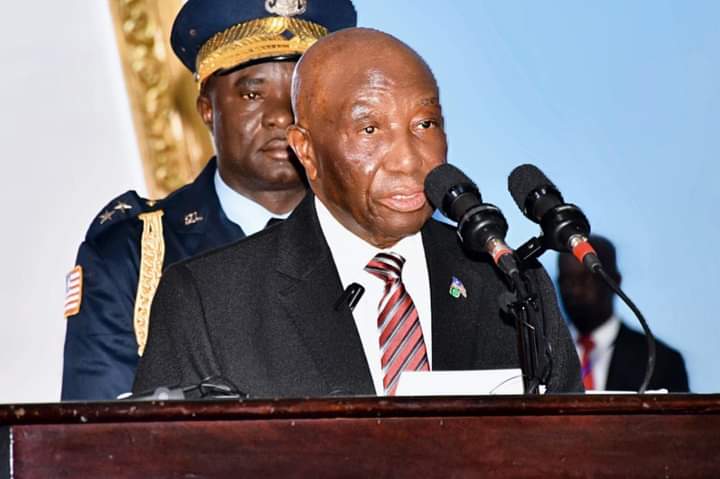President Boakai addressed the nation on Thursday, April 25, 2025, concerning the ongoing legislative impasse stemming from the disputed Speakership of the House of Representatives. He acknowledged the recent Supreme Court ruling, which reaffirmed the legitimacy of Speaker Koffa’s election, yet stressed that the underlying conflict remained unresolved. Emphasizing his commitment to upholding the Constitution and the principle of a functional government, President Boakai declared his administration would continue to work with the existing legislative quorum as defined by the Supreme Court, while engaging in consultations with national stakeholders to find a constitutionally sound resolution to the crisis. He denounced acts of lawlessness and affirmed that the government would not be held hostage by narrow interests, vowing to uphold the rule of law and ensure the delivery of essential services.
The President expressed concern about the protracted nature of the legislative division, highlighting its detrimental impact on public trust in one of the nation’s most crucial democratic institutions. He condemned the recent arson attack on the Capitol Building and other acts of vandalism targeting public institutions, characterizing them as attempts to sow chaos and undermine the democratic process. President Boakai pledged to investigate these incidents thoroughly and bring those responsible to justice, underscoring his commitment to a nation governed by law, not mob rule or self-serving ambition. He emphasized the need for peace and national harmony and assured the public that the government remained steadfast in its duty to maintain order and uphold democratic values.
The Supreme Court’s ruling, while confirming Speaker Koffa’s position, has demonstrably failed to quell the deep divisions within the House of Representatives. President Boakai’s assertion that the problem remains unresolved points to the complexity of the situation, suggesting that a mere legal pronouncement is insufficient to restore stability and functionality to the legislature. The fact that he has initiated broad consultations, involving traditional and other national leaders, signifies a recognition of the need for a comprehensive and consensual approach, going beyond the confines of the courtroom. This indicates a potential move toward political solutions, potentially involving negotiations and compromises among the contending factions.
Speaker Koffa, whose Speakership was reaffirmed by the Supreme Court, has reportedly extended an olive branch to his rivals, including “Regime Speaker” Richard Koon and Deputy House Speaker Thomas Fallah. This gesture of reconciliation, while potentially positive, remains to be tested in the crucible of the deeply entrenched political divisions. Whether these overtures will lead to genuine dialogue and compromise remains uncertain. The fact that consultations are ongoing following the President’s speech suggests that a clear path forward has yet to be defined. The political climate remains tense, and the possibility of further escalation cannot be discounted.
The ongoing crisis underscores the fragility of Liberia’s democratic institutions and the challenges in navigating political disputes. The arson attack on the Capitol Building symbolizes the potential for political tensions to spill over into violence and undermine the symbols of national unity and democratic governance. The President’s strong condemnation of these acts and his commitment to upholding the rule of law are crucial for maintaining order and preserving the integrity of the democratic process. However, lasting stability will require more than just legal pronouncements and condemnations.
The situation demands a multifaceted approach that addresses the underlying political grievances and promotes a culture of dialogue and compromise. The President’s call for consultations and his engagement with various stakeholders represent an important step in this direction. However, the success of these efforts will ultimately depend on the willingness of all parties to engage in good faith and prioritize the national interest over narrow political ambitions. The coming days and weeks will be critical in determining whether Liberia can overcome this political impasse and consolidate its democratic gains. The interplay between legal pronouncements, political maneuvers, and public opinion will shape the trajectory of this unfolding crisis.














